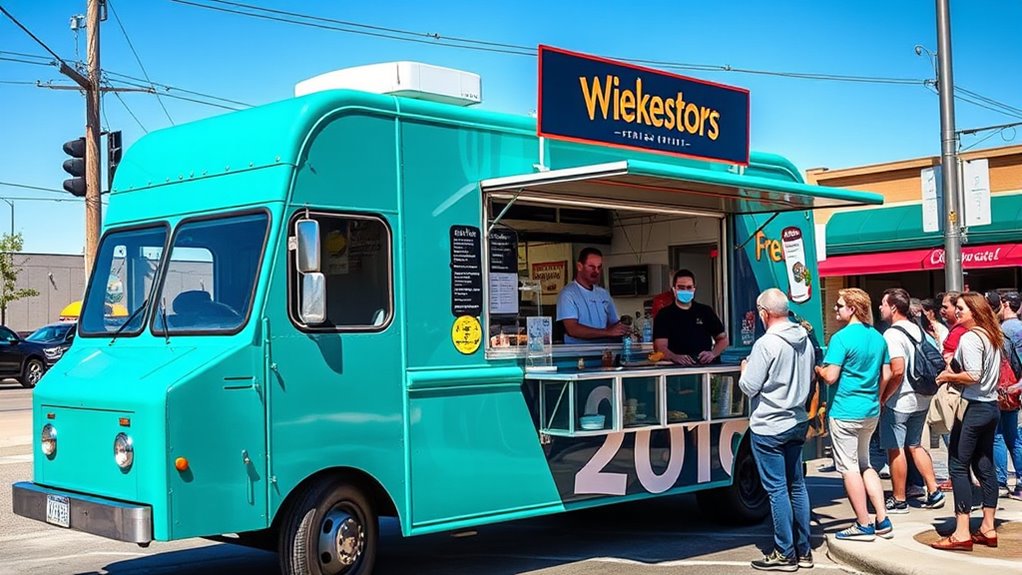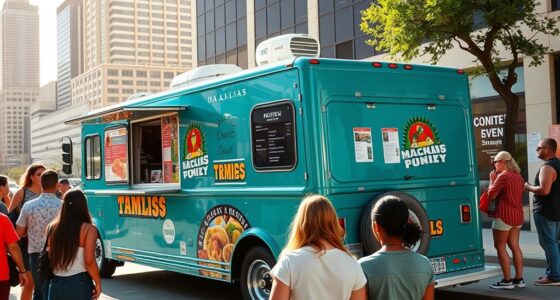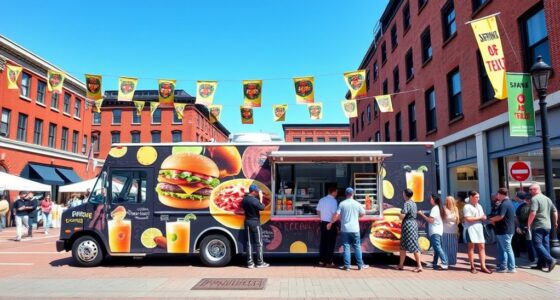To open a food truck in Fargo, North Dakota, you’ll need to secure permits from Fargo Cass Public Health and North Dakota Food and Lodging, with costs typically around $75-$150. Choose prime locations like Fargo Food Truck Park and plan your menu to meet safety standards. Budget for truck costs, licenses, and marketing. Focus on social media and local events to grow your customer base. Keep exploring further to master every step for a successful launch.
Key Takeaways
- Secure necessary permits through Fargo Cass Public Health or North Dakota Food and Lodging, including food establishment plan review and event permits.
- Budget for initial costs like truck purchase ($30,000–$85,000), permits ($75–$150), equipment, and commissary rent ($300–$800/month).
- Operate in designated high-traffic locations such as Fargo Food Truck Park and attend community events for visibility.
- Develop a compliant menu meeting FDA Food Code 2017 standards, with proper labeling, temperature control, and ingredient sourcing.
- Promote your food truck via social media, participate in local festivals, and use data analytics to target customers effectively.
Navigating Permit and Licensing Requirements in Fargo
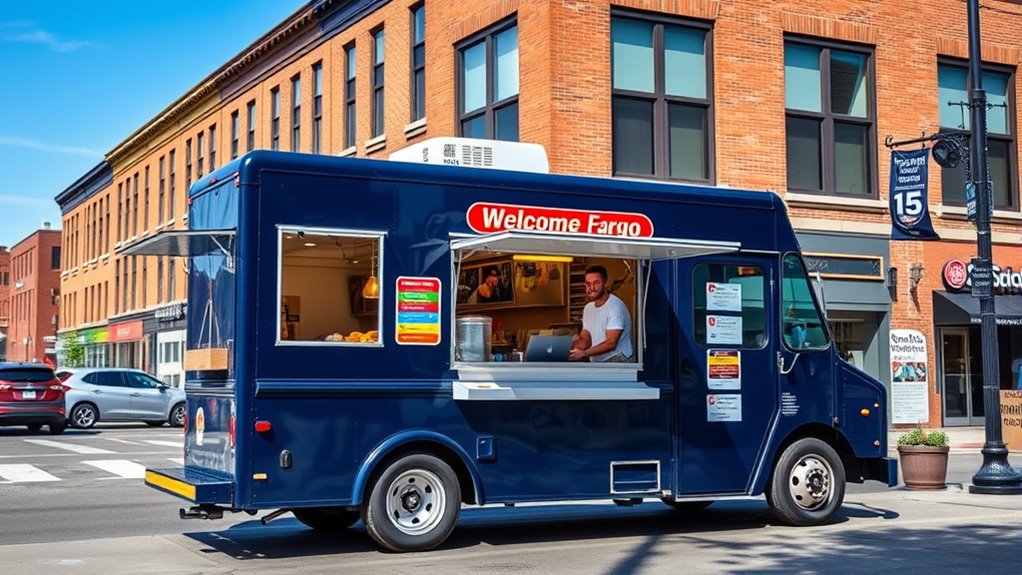
Understanding permit and licensing requirements in Fargo can seem complex, but understanding the key steps makes it manageable. First, you’ll need to get licensed through Fargo Cass Public Health (FCPH) or North Dakota Food and Lodging, depending on where you operate. If you’re within Fargo city limits, you’ll need a non-transferable food and beverage license issued by FCPH. For events outside Fargo, such as at Red River Valley Fairgrounds, state licensing applies through ND Food and Lodging. You can benefit from reciprocity between jurisdictions, but local rules still matter. Your food truck must meet FDA Food Code 2017 standards, and you’ll need to submit an application with details about your business, proof of ownership, insurance, and health and fire inspections. A commissary kitchen agreement is often required if you don’t have a fixed base. Additionally, understanding local zoning laws and any restrictions on mobile food vending can help ensure compliance with all city regulations.
Understanding Costs for Starting and Running a Food Truck
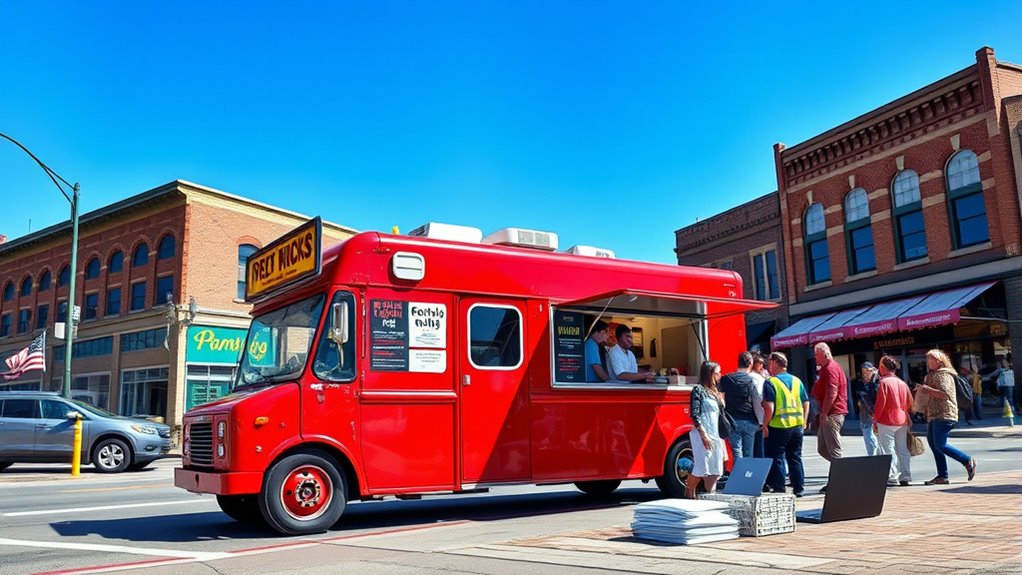
Starting and running a food truck in Fargo involves careful planning of both initial investments and ongoing expenses. Your startup costs include purchasing a truck, which can range from $30,000 to $85,000, or renting one to save upfront. Custom trailers with commercial appliances are also available, with prices based on design. Additional expenses include kitchen appliances, serveware, and storage, averaging $300–$3,000. You’ll need to budget for permits ($75–$150), initial inventory ($2,000–$3,000), and commissary rental ($300–$800 monthly). Ongoing costs include fuel, maintenance ($500–$1,000 annually), insurance, waste disposal, and winter heating. Proper budgeting guarantees smooth operation and profitability. It’s also important to account for permits and registration fees to ensure compliance with local regulations.
Prime Locations and Operating Sites for Food Trucks in Fargo
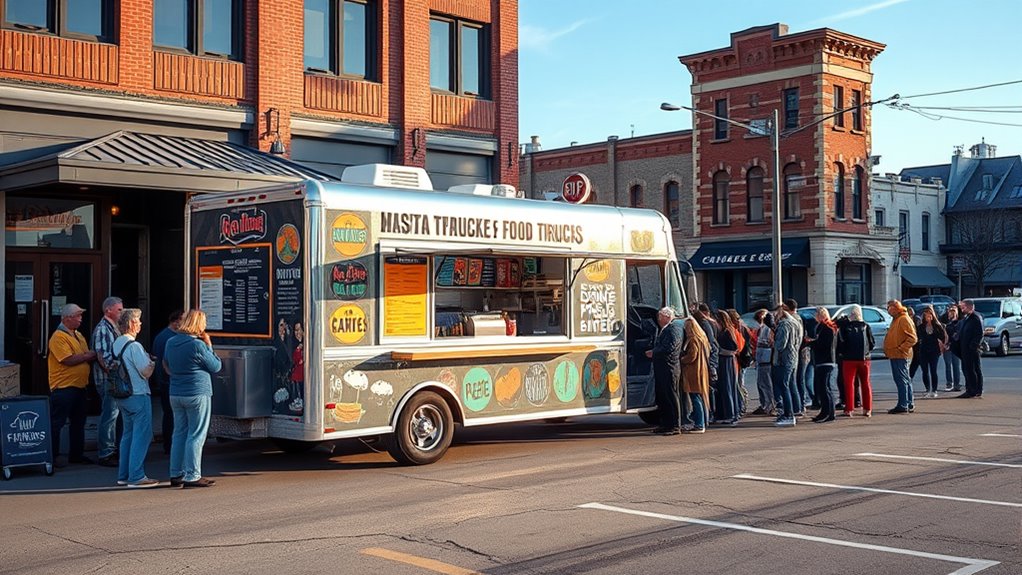
Choosing the right locations is key to your food truck’s success in Fargo. You’ll need permits for designated Park District sites and special event areas, along with access to commissary kitchens for storage and prep. Consider these options carefully to maximize visibility and meet all regulatory requirements. Additionally, selecting spots with diverse and attractive planters can enhance your food truck’s curb appeal and draw more customers.
Designated Park District Sites
Fargo’s designated park district sites provide prime locations for food trucks to operate, offering convenient and high-traffic spots for vendors. The Fargo Food Truck Park at 409 Broadway in Downtown Fargo is a popular example, running Thursdays and Fridays from 11 a.m. to 2 p.m. This central urban setting attracts steady foot traffic and supports community growth by hosting regular weekday hours. Other district sites include various concessions and recreational areas, which cater to park visitors and event attendees. Parking lots near public arenas, university buildings, and event fields are also designated for food truck operations, with clear regulations to guarantee safety and accessibility. These locations maximize exposure during festivals, corporate events, and community gatherings, making them ideal for expanding your customer base. Additionally, understanding the permissible food sources and health regulations can help ensure compliance and successful operation in these prime spots.
Special Event Permits
To operate your food truck at special events in Fargo, securing the proper permits is a necessary step. You must submit a Special Event Application at least 30 days before the event, which is reviewed on a first-come, first-served basis. Approval depends on insurance verification, permit fees, and compliance with regulations. For street closures or block parties, apply 45 days in advance through the Fargo Engineering Department. Be aware that requests for major thoroughfare closures may be denied, and barricades are required for street closures. Additionally, amplified sound permits might be necessary. The table below highlights key factors influencing your special event site selection:
| Permit Type | Required Documentation | Timing |
|---|---|---|
| Special Event Permit | Application, insurance, fees | 30 days prior |
| Street Closure Permit | Application, barricade plans, fees | 45 days prior |
| Amplified Sound Permit | Sound plan, approval | Depends on event |
| Food Vendor Permit | Food license, menu approval | Before setup |
It is also important to consider the regulations governing temporary food operations, including health and safety standards, to ensure full compliance.
Commissary Kitchen Locations
Access to a reliable commissary kitchen is essential for your food truck’s daily operations in Fargo, providing a centralized space for prep, storage, and sanitation. Prime locations like Square One Rental Kitchen at 1407 1st Ave N offer commercial-grade equipment and convenient access. These kitchens support both part-time and full-time operations with 24/7 access and security features. When choosing a site, consider proximity to high-traffic areas, delivery points, and food suppliers to reduce logistical challenges. Facilities typically include:
- Commercial-grade equipment like mixers, blast chillers, and ovens
- On-site dry, cold, and frozen storage options
- Support for sanitation and waste disposal standards
- Heating and refrigeration for seasonal needs
- Easy access for loading and unloading during busy hours
- Olympic Start Dates, such as the 2024 Summer Olympics beginning on July 26, can influence local activity levels and customer flow, making location choice even more critical.
Crafting a Compliant and Appealing Menu
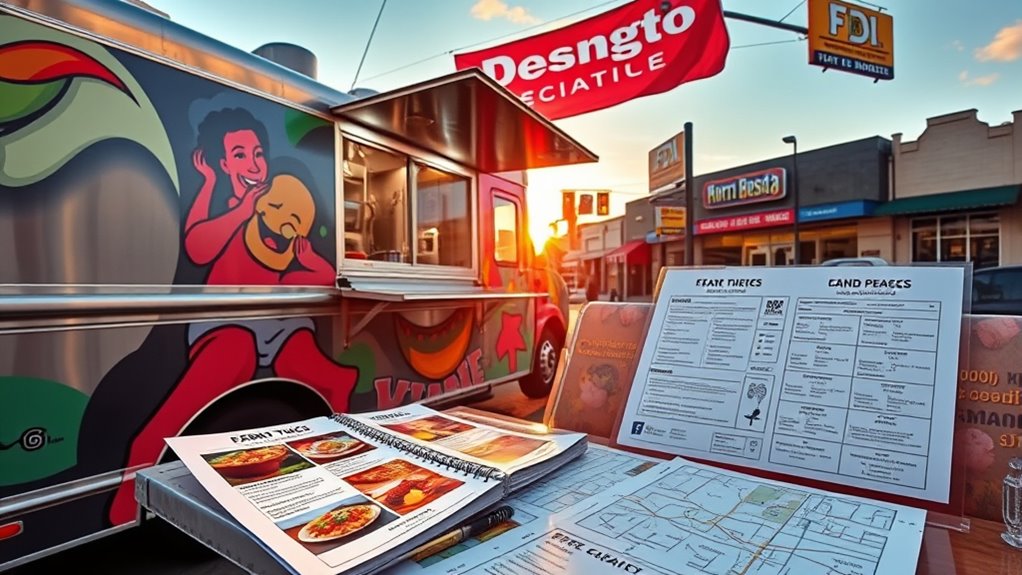
When crafting your menu, you need to guarantee all ingredients meet Fargo’s food safety standards and are properly labeled to avoid misbranding. You’ll also need to get your menu approved by local authorities, confirming it complies with licensing and safety regulations. Focusing on clear descriptions and approved item choices helps you create an appealing, compliant menu that passes all inspections. Additionally, ensuring your menu aligns with food safety standards and includes accurate labeling is essential for legal compliance and customer trust.
Menu Ingredient Standards
Crafting a compliant and appealing menu for your food truck starts with selecting ingredients that meet strict safety and quality standards. You must guarantee all ingredients comply with North Dakota Food Code, referencing the FDA Food Code 2017, avoiding adulterated or misbranded products. Proper temperature controls are essential for perishables to prevent bacterial growth. Packaged items should have accurate labels with allergen info, and condiments must be served in single-use portions or sanitized dispensers from approved sources. Using supported browsers enhances security and functionality. – Use ingredients from certified suppliers with traceability. Avoid raw or undercooked items unless strict controls are in place. Limiting ingredients requiring extensive refrigeration is advisable due to space constraints. Clearly label major allergens on menus. Maintain thorough records of ingredient purchases and usage, and verify the trustworthiness of your suppliers to ensure ingredient integrity.
Menu Approval Process
To guarantee your food truck operates smoothly and stays compliant with local regulations, your menu must undergo a thorough approval process. You need to submit your menu as part of the Mobile Food Unit Plan Review for licensing in North Dakota. Certify your items match exactly with your application to prevent delays or rejection. Any changes after approval may require re-submission. Your menu must meet food safety standards, including allergen labeling and proper preparation methods. The Fargo Cass Public Health reviews your menu using the FDA Food Code as a standard, verifying that your items are safe to prepare within your truck’s limits. Additionally, understanding eye patch benefits can be useful if you’re looking to enhance your appearance or incorporate quick self-care routines into your busy schedule. Here’s what’s involved:
| Step | Key Focus |
|---|---|
| Submission | Accurate, detailed menu aligned with application |
| Review & Approval | Food safety, operational feasibility, compliance |
| Post-Approval Checks | On-site inspections, ongoing compliance |
Effective Marketing Strategies to Grow Your Food Truck Business
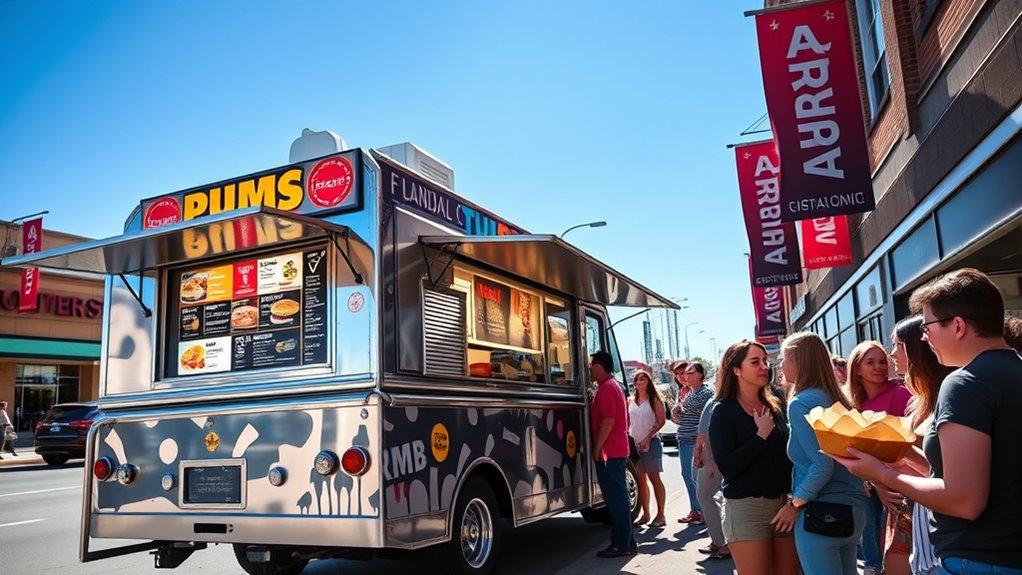
Effective marketing is essential for growing your food truck business and standing out in a competitive market. Leveraging social media is a proven strategy; 68% of owners promote their trucks online, with Facebook leading at 75%. Social campaigns can boost sales by 20%, especially when engaging younger audiences on Instagram, TikTok, and Snapchat. You should also participate in local events and food festivals—80% of trucks see increased awareness and foot traffic this way. Using data analytics and mobile apps can improve your marketing ROI by 25% and make your truck easier to find. Additionally, developing loyalty programs increases repeat visits by 30%, rewarding loyal customers and encouraging social sharing. Implementing targeted advertising through digital platforms can further optimize your outreach efforts. These strategies assure your food truck captures attention and builds a loyal customer base quickly. Understanding audience demographics can help tailor your marketing messages more effectively.
Ensuring Regulatory Compliance and Passing Inspections
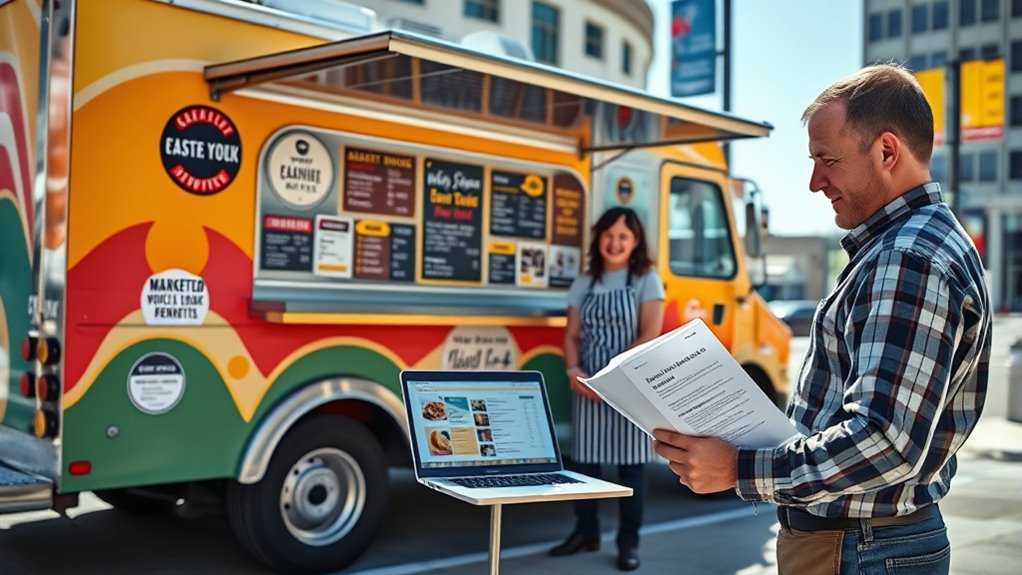
Ensuring your food truck complies with local regulations and passes inspections is essential for lawful operation and customer trust. You must obtain a license from Fargo Cass Public Health or the state Food and Lodging Unit, depending on your jurisdiction. Food safety inspections follow the FDA Food Code 2017, emphasizing sanitation, safe handling, and proper equipment. Regular cleaning and hygiene are mandatory, and violations can lead to fines or suspension. Before starting, submit a Food Establishment Plan Review detailing your layout, equipment, and processes, and get approval. Staff training in food safety is highly recommended, and documentation may be requested during inspections. Staying compliant means proactively maintaining cleanliness, proper documentation, and preparing for routine health checks.
| Licensing | Food Safety Inspections | Plan Review & Staff Training |
|---|---|---|
| Obtain licenses from Fargo Cass Public Health or state | Follow FDA Food Code 2017 | Submit detailed plan before opening |
| Separate licenses for events or permanent vending | Regular sanitation of contact surfaces | Train staff in proper food handling |
| Registration for trailers over 3,000 lbs | Conduct routine health inspections | Keep documentation ready |
| Apply for Mobile Food License if catering/delivery | Focus on cleanliness, hygiene | Ensure ongoing compliance |
| Pay applicable fees | Violations can lead to fines or suspension | Resubmit plans for modifications |
Frequently Asked Questions
Can I Operate a Food Truck in Fargo Without a Local License?
You can’t operate a food truck in Fargo without a local license. Doing so violates city and state health regulations, risking fines or shutdowns. You must obtain a food vendor permit or a contract from the Fargo Park District for each event or location. Without proper licensing, you’re not only illegal but also unprotected by insurance, making operating without a license a risky move. Always guarantee you meet all licensing requirements before starting.
Are There Specific Health Insurance Requirements for Fargo Food Truck Operators?
Did you know that nearly 9 out of 10 Americans have some form of health insurance? As a Fargo food truck operator, there aren’t specific health insurance requirements tied to your business. You’re responsible for your coverage, but Fargo and North Dakota don’t mandate health insurance for small business owners. It’s wise to contemplate individual or group plans to protect yourself from medical costs, especially since workplace injuries aren’t covered by personal insurance.
How Do I Find a Commissary Kitchen in Fargo for My Food Truck?
To find a commissary kitchen in Fargo, start by researching options like Square One Rental Kitchen, which offers commercial-grade facilities suited for food trucks. Check their amenities, such as equipment availability, storage, and sanitation compliance. Contact local providers like U.S. Mobile Kitchens or Golden State Trailers for mobile options. Confirm the kitchen meets North Dakota health regulations and zoning laws, and compare costs and proximity to your preferred operating areas.
What Are the Restrictions on Serving Alcohol From a Food Truck in Fargo?
Like a knight with a squire, you must follow rules to serve alcohol from your food truck in Fargo. You need a local and state alcohol license, and alcohol must come from licensed wholesalers. Operating restrictions include designated areas, specific hours, and compliance with health and safety laws. You can’t serve or store alcohol on Fargo Park District property, and all marketing must adhere to strict advertising regulations.
Is There a Limit to the Number of Food Trucks Allowed at Fargo Events?
You wonder if there’s a limit on food trucks at Fargo events. The answer varies by event, as organizers set capacity based on site needs, attendance, and logistics. Usually, there’s no fixed cap, but permits, health inspections, and space constraints naturally limit how many trucks can participate. Larger events might host around seven vendors, while smaller ones could have fewer, all depending on specific arrangements and site approvals.
Conclusion
Starting your food truck in Fargo means steering permits, understanding costs, choosing prime locations, crafting a tempting menu, and implementing effective marketing. Stay compliant, stay consistent, and stay passionate. Focus on building relationships, fostering community, and delivering quality. Keep learning, keep adapting, and keep serving. With dedication and planning, you’ll turn your food truck into a thriving, beloved part of Fargo’s vibrant food scene. Your success begins with your commitment—so get started today!
